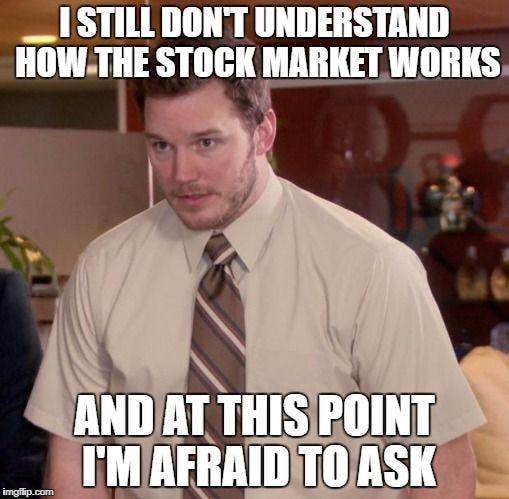Think you know what a stock is? It’s that thing that values companies and it goes up and down on the stock market, you know, in NYC, where like all the graying men are yelling at each other right? Partially true yes, but there are many more intricacies that comprise what a stock actually consists of. Maybe you are thinking “I already know what a stock is, I watch Jim Cramer all the time!”, or maybe you are more like this:
Either way, I’m going to get into the very basics of what a stock is, your rights as a stockholder, and how a stock price moves up and down (why those guys on Wall Street are yelling at each other). Hopefully this will not only provide additional education for the experienced investor, but also crucial information to the newbie and the person just wanting to deepen their understanding of our financial system.
So, what is a stock? A stock is simply a security (a tradeable asset) that represents a share of ownership of a company. So when you buy 1 share of Apple (AAPL), you now are technically a partial (very partial) owner of the company. Apple currently has about 16 billion outstanding shares of stock, so buying 1 share would give you a 1/16,000,000,000 share of ownership. Apple is currently trading at $165 a share as of this writing so this gives the company a value of 16 billion x $165 = $2.65 trillion (side note - this is the most valuable company in the world for anyone curious).
What rights do you have once you become a shareholder? So you take the plunge buy a share of AAPL stock. What does this entitle you to? Firstly, you can now vote in shareholder meetings. This is where the shareholders elect a board of directors, who are responsible for operating the company and increasing its value. They often do this by hiring officers such as a Chief Executive Officer or CEO to manage the company for them. If you do not like the way the company is being managed as a shareholder, you can vote to replace members of the board. Secondly, you have the right to the profits of the company. When a companies revenues exceeds its expenses it has profits that it owes to shareholders. They can distribute these profits in the form of dividends, which are direct payments to shareholders or they can retain the earnings and reinvest them in the company in order for the company to grown and increase the value of the stock. Lastly, as a shareholder, the share of stock that you own is your personal property. It is an asset that you as the shareholder have the right to sell at the time you see fit.
How does a stock’s price move up and down? A stock’s price increases when there more buyers than sellers of the stock. When buyers run out of sellers to buy from at a certain price, they move onto a higher price to buy from. This also works the other way - when more shareholders are looking to sell the stock than buyers wanting to purchase, the sellers will lower the price of the stock in order to entice more buyers to entire the market. This is a very simple lesson in supply and demand. The factors that influence this supply and demand though are anything but simple. A million differing factors play into why a stock price increases or decreases. Company performance, market conditions, interest rates, government regulation, and liquidity in the market all are factors just to name a few. However, these are all the “whys” of stock price movement, the “how” is the simple lesson of supply and demand I stated earlier.
Now when you see that Warren Buffett owns 911 million shares of Apple, you now have a framework of what that actually means besides the fact that it is a lot of money. There are currently around 4,000 publicly traded companies that you can buy shares of in the United States. Which stocks you buy are your choice and decisions should be taken carefully with much research. Many times this is better done by using an accredited financial professional to act on your behalf. Either way, I believe in knowing where my money is going and what I am actually buying and I suspect you feel the same. Hopefully this short lesson further educated you on what a stock is and it’s characteristics to help in your decision making.
Life is worth the living, just because He lives,
Trey



I am glad to have a professional handle my finances but I feel a responsibility to ask questions for clarity. Your article is on point, thanks for posting,